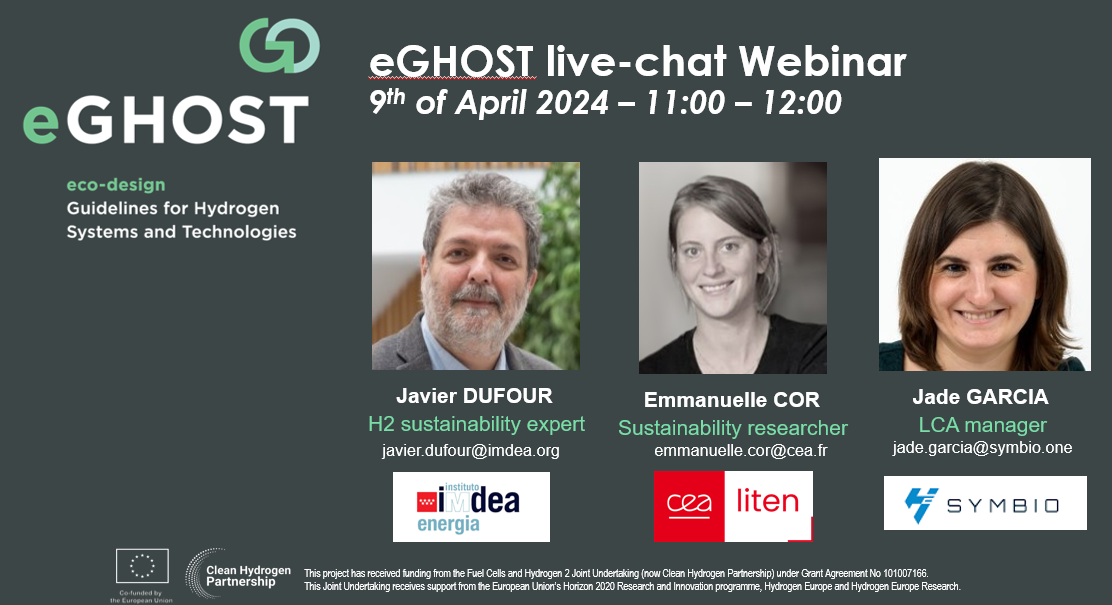
Europe’s pioneering project eGHOST comes to an end and launches the eGHOST White Book
eGHOST guides a sustainable design that minimises the economic, environmental and social impacts of fuel cells and hydrogen (FCH) products throughout their life cycle.
It is published the eGHOST White Book: aguidance and reference book for any future FCH eco-design project.
The pioneering project eGHOST comes to an end in May 2024. It has improved the understanding of hydrogen systems as a sustainable investment according to the EU taxonomy framework by incorporating a triple-impact decision-making approach that includes environmental, social and economic aspects from a life-cycle perspective. The lessons learned have been integrated into the eGHOST White Book, a guidance and reference document for any future hydrogen technology eco-design project.
Throughout the life cycle of the project, the effort and involvement of each project partner has been key. IMDEA Energy (Spain) coordinates the consortium, which also includes CEA (France), the University of Ljubljana (Slovenia), the Aragon Hydrogen Foundation (Spain), SYMBIO France (France), and the Institute of Applied Energy (Japan). For more than 3 years the project has worked on the development of specific eco-design guidelines for two fuel cells and hydrogen (FCH) products: a Proton Exchange Membrane Fuel Cell (PEMFC) stack and a Solid Oxide Electrolysis Cell (SOEC) stack. The core aim of this guidance, along with the eGHOST White Book, is to provide a basis to achieve and ensure sustainable-by-design (SbD) FCH products according to environmental, social and economic aspects.
One of the first steps of the eGHOST project involved the definition of the reference case scenario for both FCH products and the assessment of these references in terms of environmental, economic and social potential impacts, identifying sustainability hotspots and potential improvements. Based on the eco-design strategy wheel and those sustainability hotspots, eco-design actions were implemented, eco-designed product concepts were developed (e.g. short-term, medium-to-long-term, optimistic and disruptive concepts for the PEMFC stack; realistic and optimistic concepts for the SOEC stack), and eco-design actions were prioritized (e.g. PEMFC: reduction of platinum loading; SOEC: weight reduction by increasing power density) according to their influence on the sustainability profile (environmental, economic and social performance) of the PEMFC and SOEC stacks.
This process culminated with the formulation of the eco-design guidelines for FCH products to support decision-making processes of the H2 value chain actors, ensuring that the transition to a hydrogen-based economy is not only technically feasible but also environmentally, socially and economically beneficial for all stakeholders involved.
In the last 3 months, the project has intensified its communication actions, with the aim of sharing its results. The following are worth mentioning:
Bilbao, March 2024: eGHOST Symposium. With a focus on promoting sustainable and clean energy solutions, EHEC (European Hydrogen Energy Conference) seeks to play a crucial role in advancing the adoption of hydrogen as a clean energy source across Europe and the world. For this reason, the project hosted its Symposium in this professional context.
Brussels, May 2024: eGHOST Day. The whole Consortium has come together to organize a results presentation day to share this first milestone in the eco-design criteria in the European hydrogen sector. To this end, eGHOST Day was aimed at professionals in the sector, both from the academic and research context, as well as from the industry and policy-making one.
Madrid, May 2024: Spring School. The aim of this Spring School has been to show and to train in the eco-design of hydrogen systems following the guidelines developed in the eGHOST project.
About the Clean Hydrogen Partnership
The Clean Hydrogen Partnership’s main objective is to contribute to EU Green Deal and Hydrogen Strategy through optimised funding of R&I activities. The Clean Hydrogen Partnership is the successor of the Fuel Cells and Hydrogen 2 Joint Undertaking (FCH 2 JU) and has taken over its legacy portfolio as of 30 November 2021.
Contact:
Dr. Javier Dufour, Project Coordinator eGHOST at IMDEA Energy: javier.dufour@imdea.org




